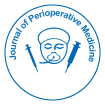
Journal of Perioperative Medicine
Open Access
ISSN: 2684-1290

ISSN: 2684-1290
Commentary - (2023)Volume 6, Issue 2
Pain management is a critical aspect of patient care, particularly in the postoperative period. Intercostal Nerve Blocks (ICNB) are commonly used for the management of acute pain following thoracic surgery. ICNB involves the injection of local anaesthetic into the intercostal spaces, which blocks nerve conduction and provides effective analgesia.
Mechanism of action
ICNB involves the injection of local anaesthetics such as bupivacaine or ropivacaine into the intercostal spaces. Local anaesthetics act by blocking nerve conduction by binding to sodium channels, thereby preventing the propagation of action potentials. ICNB provides effective analgesia by blocking the transmission of pain signals from the thoracic wall to the central nervous system.
Indications
ICNB is commonly used for the management of acute postoperative pain following thoracic surgery. It is also used for the management of chronic pain conditions such as intercostal neuralgia and rib fractures. ICNB is particularly effective in patients who are unable to tolerate systemic analgesics or those who experience adverse effects from opioids.
Technique
ICNB is typically performed under ultrasound guidance to ensure accurate placement of the needle and the distribution of local anaesthetic. The needle is inserted into the intercostal space adjacent to the affected rib, and the local anaesthetic is injected slowly to ensure adequate distribution. Single-injection ICNB can provide effective analgesia for up to 8-12 hours following the procedure.
Benefits
ICNB offers several benefits over systemic analgesia in the management of postoperative pain. It provides targeted pain relief relief, reducing the need for systemic analgesics and their associated adverse effects. ICNB can also improve patient outcomes by reducing the risk of postoperative complications such as pneumonia and atelectasis, which are associated with inadequate pain control.
Side effects
ICNB is generally considered safe, with few side effects. The most common side effect is local anaesthetic toxicity, which can occur if excessive amounts of local anaesthetic are injected or if the injection is inadvertent into a blood vessel. Systemic toxicity can lead to cardiovascular and central nervous system effects, including arrhythmias, seizures, and cardiac arrest. Other potential side effects include bleeding, infection, and nerve injury.
Limitations
ICNB has several limitations that must be considered when selecting the appropriate pain management strategy. The duration of analgesia is limited, and single-injection ICNB may not provide adequate pain control beyond the immediate postoperative period. The effectiveness of ICNB is also dependent on the accuracy of needle placement and the distribution of local anaesthetic, which can be challenging in some patients.
Future directions
Several studies have investigated the use of adjuvants to local anaesthetics in ICNB to prolong the duration of analgesia. Adjuvants such as opioids and alpha-2 agonists have been shown to improve analgesia and reduce the need for systemic analgesia. There is also growing interest in the use of continuous ICNB, which involves the placement of a catheter into the intercostal space and the infusion of local anaesthetic for prolonged analgesia.
Single-injection ICNB is a safe and effective technique for the management of postoperative pain following thoracic surgery. It provides targeted pain relief and reduces the need for systemic analgesics. ICNB has few side effects, although local anaesthetic toxicity can occur. The effectiveness of ICNB is limited by the duration of analgesia and the accuracy of needle placement.
Citation: Rostagno C (2023) A Commentary on Effects of Single-Injection Intercostal Nerve Block. J Perioper Med. 6:157.
Received: 01-Mar-2023, Manuscript No. JPME-23-22776 ; Editor assigned: 03-Mar-2023, Pre QC No. JPME-23-22776 (PQ); Reviewed: 17-Mar-2023, QC No. JPME-23-22776 ; Revised: 24-Mar-2023, Manuscript No. JPME-23-22776 ; Published: 31-Mar-2023 , DOI: 10.35248/2684-1290.23.6.157
Copyright: © 2023 Rostagno C. This is an open-access article distributed under the terms of the Creative Commons Attribution License, which permits unrestricted use, distribution, and reproduction in any medium, provided the original author and source are credited.